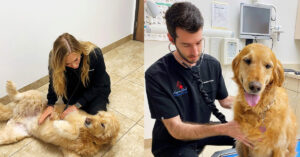Veterinary medicine, like its human counterpart, has evolved over the years to include a variety of treatment modalities. With growing concerns among pet owners about the long-term impacts of traditional medications, many are now exploring alternative veterinary medicine as a way to address their pets’ health needs. Alternative holistic pet medicine encompasses several treatment options, including acupuncture, chiropractic care, herbal medicine, and physical therapy. Each approach has its merits and can provide relief for pets with certain conditions.
Acupuncture for Pets
Acupuncture is an ancient healing practice rooted in Traditional Chinese Veterinary Medicine (TCVM) that spans thousands of years. It entails the insertion of slender needles into designated points on the body to encourage the circulation of energy, known as Qi. Acupuncture can help with a range of issues, including chronic pain, arthritis, gastrointestinal disorders, and more. It’s especially beneficial for older pets that may not tolerate conventional pain medications well.
Acupuncture sessions usually last between 15 to 30 minutes. Most pets tolerate the procedure well, and some even find it relaxing. Choosing a certified veterinary acupuncturist is essential to ensure safe and effective treatment.
Herbal Medicine for Pets
Herbal medicine involves using plants or plant extracts to promote health, prevent illness, or treat various conditions. Veterinary herbal medicine can include Chinese herbs, Western herbs, Ayurvedic herbs, and more.
Herbs can be used to support the immune system, reduce inflammation, improve digestion, and treat a wide range of health issues. However, working with a veterinarian trained in herbal medicine is essential, as some herbs can interact with conventional medications or be toxic if misused.
Physical Therapy for Pets
Physical therapy (or rehabilitation) is vital for helping pets recover from surgery, injury, or chronic conditions such as arthritis. A veterinary rehabilitation specialist will assess your pet’s specific needs and develop a tailored therapy plan.
Physical pet therapy includes exercises, hydrotherapy (aquatic therapy), laser therapy, and massage. The goal is to improve mobility, reduce pain, and enhance quality of life. It’s especially beneficial for older pets, those with mobility issues, or pets involved in sports.
Choosing the Right Approach
It’s important to note that alternative veterinary medicine is not a replacement for conventional veterinary care. Instead, it can complement traditional treatments to provide a holistic approach to your pet’s health.
Before starting any alternative treatment, it’s essential to consult with your veterinarian. They can help you determine the most suitable options for your pet’s needs and ensure they receive the best possible care.
Alternative veterinary medicine offers a range of options for enhancing your pet’s health and well-being. By exploring treatments like acupuncture, herbal medicine, and physical therapy, you can provide your furry friend with a comprehensive approach to healthcare.
As the field of alternative veterinary medicine continues to grow, pet owners have an increasing number of options to consider when addressing their pets’ health concerns. By working with a knowledgeable veterinarian and exploring a combination of conventional and alternative treatments, you can provide your pet with the best possible care and improve their quality of life.
Dr. Mathew Cohen, DVM MS CVA, the Medical Director at Laguna Beach Veterinary Medical Center, is certified in Veterinary Acupuncture and Herbal Medicine from Chi University.
Call (949) 464-1000 to schedule an appointment with Dr. Cohen today.


